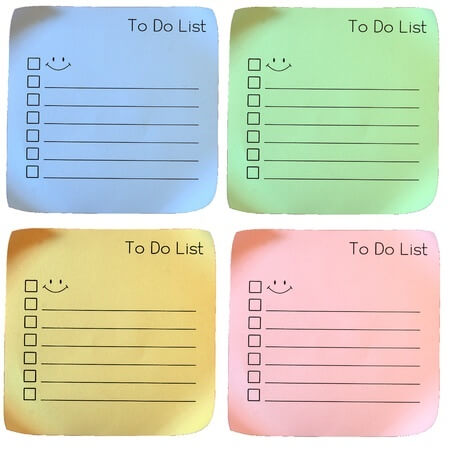 What’s your favorite day of the work week? I bet you said “Friday,” right? Because it’s the day before the weekend starts. Fair enough. Tuesdays are my favorite day of the week. Why? Because I’ve implemented a time management process that helps me stay focused and get lots of work done. I’ll lay out the basic formula here. Then you can tweak it to fit your needs.
What’s your favorite day of the work week? I bet you said “Friday,” right? Because it’s the day before the weekend starts. Fair enough. Tuesdays are my favorite day of the week. Why? Because I’ve implemented a time management process that helps me stay focused and get lots of work done. I’ll lay out the basic formula here. Then you can tweak it to fit your needs.
I use a productivity system that is a form of “batching”—in which you lump a bunch of similar items together in a batch and do them all at the same time. The thinking behind why batching works is that because the items are similar, you’ll get “in the groove” and move more quickly through the tasks. For example, you could gather all of your paperwork to be processed, set aside two hours and do all of it one fell swoop.
A variation on “batching” is “Theme Days.” That’s where my love of Tuesdays come in. At the beginning of the year, I create all-day “appointments” on my calendar for Tuesdays and name the appointment “Writing Day.” In my world, Tuesdays hold a theme of all things “writing.” When Tuesday rolls around, I load up my laptop and research materials and head off to the library for a day of intensive writing. Because I’m not in the office, there are minimal distractions, and I’m able to get a lot of focused writing time in. As an added bonus, the ideas seem to flow more smoothly. I think it’s because I love the library and my creative juices really flow when I’m there.
Now, before you decide you can’t use my system because you work in a more structured work environment (“Nice idea Jen, but my boss isn’t going to let me take off to the library”), hear me out. When I worked in a corporate environment, I used a modified version of this system. Your Theme Day can be any block of time. If a full day won’t work, think in terms of 2-4 hours blocks of time. The key to making this system work for you when you work for someone else is to get buy-in from others. Go to your boss and say that you’d like to block off 3 hours each week to focus on [insert important business-related tasks.] Put it on your calendar and when that appointment rolls around, stick to the theme and work on those tasks. Don’t get sidetracked and use that time to play “catch up” on something else.
Here are some additional tips for making a Theme Day successful.
Honor the process. Theme Days won’t work if you continually erase them from your calendar because “something came up.” When you set the original appointment, try to think of a day or time that has the least amount of time conflicts. Of course, legitimate conflicts will arise. When they do, immediately slot your Theme Day time into another place on your calendar.
Protect your mental “space”. It will most likely be difficult to fully focus on your Theme if you’re sitting at your desk. Decrease the probability of distractions by getting a conference room, or going to a different location. If this isn’t possible, then negotiate with co-workers that on Wednesdays from 10:00 – noon, you’re focusing on your “theme.” Then put in your earbuds, tune out the office hubbub and get to work.
Feed the funnel. When you know you have time set aside each week for a certain type of activity, you can “funnel” tasks into that time slot. Let’s say somebody comes to you on Tuesday with an idea that fits into your Theme. Instead of working on it immediately, you can wait until the set time on Wednesday. Doing this creates focus: you know you’ll get to the task the next day, so you can keep moving ahead right now on something else.
When you look at your task list as a series of “themes” it opens up ideas on how to best accomplish your work. When you set aside time to focus on an important theme for your work, you give that “theme” the space to thrive and grow. You’ll feel more productive, because you are focusing on work that matters. And that makes working for someone else workable for you.
Want more productivity tips? Read A 5 Step Plan to Kick-Start Your Work Week.
Copyright: chetverovod / 123RF Stock Photo
Chery,
What an excellent story of a real-life application to the idea of “batching.” Thanks so much for sharing.
Jen
Delson,
Yes, it’s easier for those of us who work for ourselves. Even so, if our colleagues who work for someone else could experience the benefits you describe, they would most likely enjoy their jobs more – not to mention feel more productive. Let’s keep spreading the word, shall we?
Jennifer